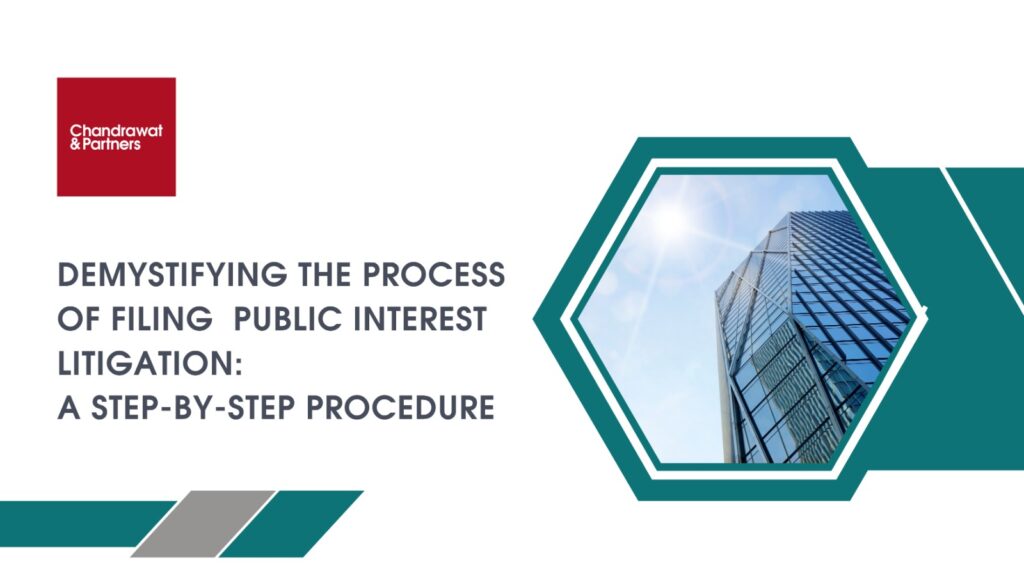Demystifying the process of filing Public Interest Litigation: A step-by-step procedure
Public Interest Litigation (“PIL”) is a powerful legal tool that allows citizens to seek justice and protect the interests of the public at large. It enables individuals or organizations to raise issues of public concern and challenge actions or omissions by the government or public authorities. Filing a PIL can be a complex and daunting process, requiring a thorough understanding of legal procedures and principles.
It is important to understand the process of filing a PIL as it is a complex process that has a step-by step approach to navigate through the intricacies of legal mechanism. It is not necessary that only the aggrieved person can file a PIL, any citizen can file a PIL, the only condition applied will be that it should be filed with the public interest and not for private gain. Even the hon’ble courts can take the suo moto cognizance if the matter is of utmost significance.
Issues that cannot be filed under PIL
The Supreme Court has issued a set of PIL guidelines according to which the following matters will not be allowed as PILs:
- landlord-tenant matters,
- service matters,
- matters pertaining to pension and gratuity,
- complaints against central and state government departments and local bodies except those relating to items 1 to 10 mentioned in the list of guidelines,
- admission to medical and other educational institutions,
- petitions for early hearing of cases pending in high court or subordinate courts.
Filing of PIL – online
There are a few steps involved in filing a case with the help of an online form in India. The procedure may differ from state to state and depending on the court in which one wants to file the case. However, the basic procedure remains the same. The first step is to search for the relevant government portal and register on the website. Complete a registration form with details like name, address, phone number, etc. Once the registration is complete, the portal will get e-mail address. One can now log on to the portal to start filing a case.
Steps For online filing a PIL in India
- To reach the main website of the Supreme Court of India, please go to https://main.sci.gov.in click on the ‘e-filing’ tab.
- Select the ‘petitioner in person’ or ‘AOR Number’ option.
- If ‘AOR Number’ is selected, provide for AOR number.
- If ‘petitioner in person’, is selected one must fill out the online forms and provide name, address, state, district, PIN code, mobile number, email, and Aadhaar card number.
- After supplying the information, click on the ‘sign up’ button at the end of the page. After completing the registration, return to the e-filing page.
- Again, click on the login choice.
- It is then possible to enter the login details, select ‘new e-filing’ and fill in the details.
- Once the payment is made, an application number will be provided.
Filing of PIL – offline
An individual (petitioner) must do thorough research on the related matter before filing a PIL in the courts. Once an individual has decided to file a PIL, he should collect all appropriate information and the required documents to strengthen and fight the case.
Steps to be taken for filing an offline PIL:
- Approach a public interest lawyer or organization to file the case.
- Collect necessary documents such as title deeds, proof of residence, identity proof, notice, resettlement policy if any, and photographs of the eviction.
- List names and addresses of all aggrieved parties approaching the court.
- List names and addresses of government agencies from which relief is sought.
- List facts giving rise to violations of fundamental rights.
- List dates indicating the duration of stay at the site, when the eviction took place, when and if an eviction notice was provided, and other important details related to the eviction.
- Clearly mention the relief being sought from the court.
Services we offer
Chandrawat and Partners hold a team of competent lawyers from a wide range of related specialist areas who can assist in following services:
- Our team can act as a pillar of support for underprivileged individuals when their rights are violated, and we can assist them in bringing their cases to the court.
- Our firm also advice the clients in order to attain their goals, as one of the major aims of filling the PIL is the policy implementation by the federal and state government.
- We offer pro bono or reduced-cost legal services to individuals or organizations that may lack the financial means to pursue litigation because we aim for ensuring access to justice and empowers marginalized groups to seek legal remedies.
- Our team of lawyers have excellent legal acumen and experience in handling such matters. We assist clients in the documentation requirements for filing the PIL.
For more information or queries, please email us at
enquiries@chandrawatpartners.com




